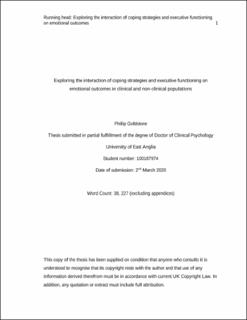| dc.contributor.author | Goldstone, Philip | |
| dc.date.accessioned | 2021-02-04T10:35:56Z | |
| dc.date.available | 2021-02-04T10:35:56Z | |
| dc.date.issued | 2020 | |
| dc.identifier.citation | Goldstone, Philip (2020) Exploring the interaction of coping strategies and executive functioning on emotional outcomes in clinical and non-clinical populations. Doctoral thesis, University of East Anglia. https://ueaeprints.uea.ac.uk/id/eprint/77537/ | en_US |
| dc.identifier.uri | https://hdl.handle.net/11250/2726125 | |
| dc.description.abstract | Context: The existing literature indicates executive functioning (EF) deficits are related to a range of coping strategies, which in turn have been related to emotion regulation (ER) difficulties. However, less is known about the specific interactions between these constructs with attempts made to integrate theoretical models of EF or ER for neurological conditions.
Aim: The broad aim of this portfolio is to explore ways specific EF domains interact with coping strategies in predicting ER difficulties. This will further inform existing clinical models of adjustment difficulties following Acquired Brain Injury (ABI) and Multiple Sclerosis (MS). Two papers are presented: a systematic review which explores relationships between EFs and mood outcomes via coping styles, and a quantitative study which explored interactional effects between aspects of dispositional mindfulness and EFs on ER difficulties.
Results: Findings from the systematic review provide support for a range of adaptive coping strategies mediating and moderating relationships between specific EFs and mood outcomes for Multiple Sclerosis. The evidence for ABI is mixed and inconclusive, possible due to heterogeneity in brain injury samples whose patterns of cognitive issues could for some be protective but for others be problematic for ER. Findings from the empirical paper indicate some specific EF abilities related to cognitive flexibility may play a role in ER, and therefore may be of clinical relevance to clinical populations.
Conclusions: The findings of this portfolio indicate potential positive implications for adaptive coping strategies when accounting for EF deficits, alongside findings of cognitive flexibility being associated with specific aspects of mindfulness and ER. However, further research is needed to verify and replicate those findings with better quality study designs and clinical populations where EF difficulties are apparent. Only by addressing these areas of future research can clinical recommendations regarding specific coping strategies be made for EF difficulties. | en_US |
| dc.publisher | University of East Anglia | en_US |
| dc.subject | emotional outcomes | en_US |
| dc.subject | clinical populations | en_US |
| dc.subject | non-clinical populations | en_US |
| dc.subject | nevrologiske lidelser | en_US |
| dc.title | Exploring the interaction of coping strategies and executive functioning on emotional outcomes in clinical and non-clinical populations | en_US |
| dc.type | Doctoral thesis | en_US |
| dc.description.localcode | måsjekkes | |
